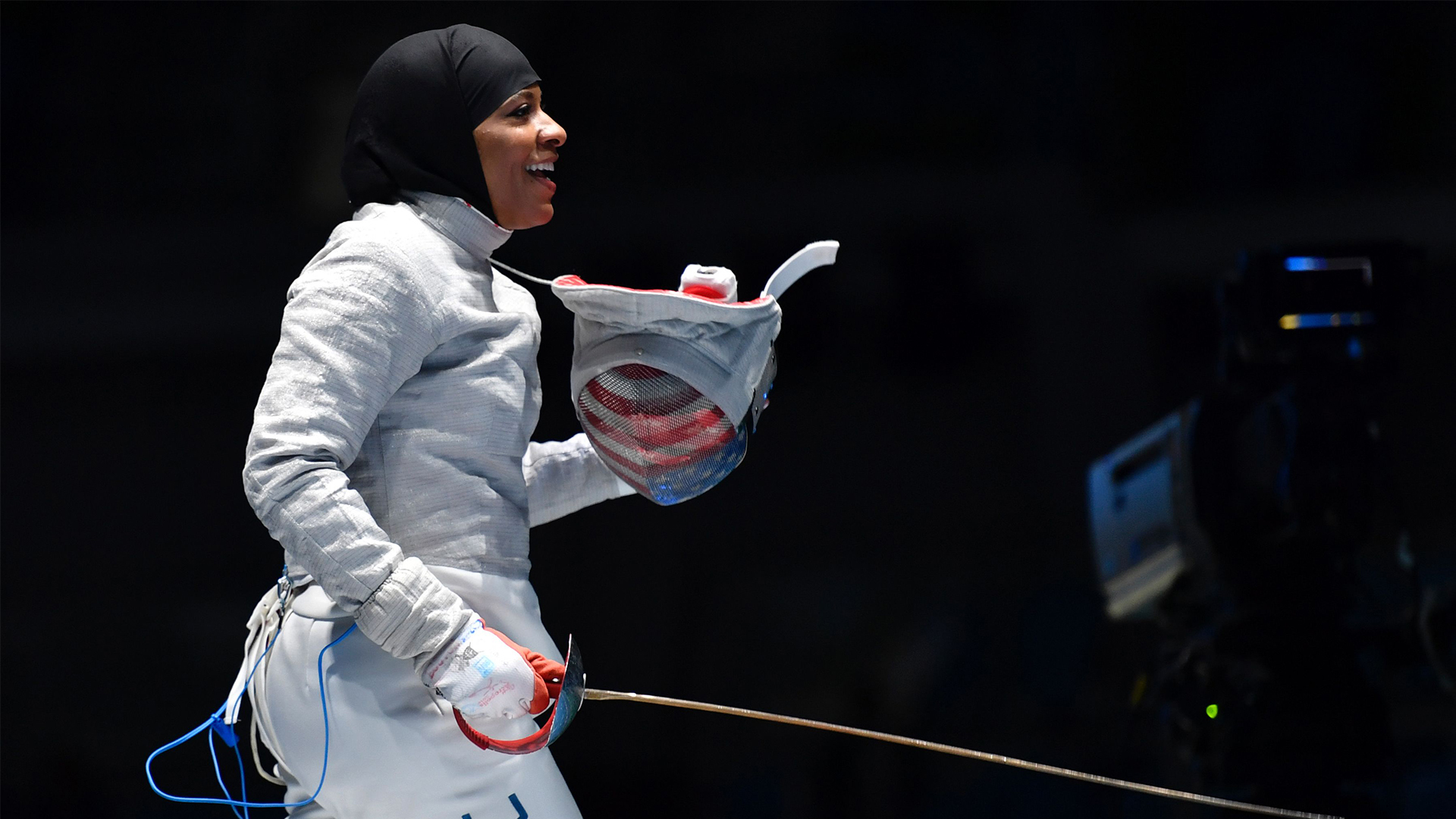From Olympic gold medalist Ibtihaj Muhammad to world-renowned sports activist Asma Elbadawi, Muslim women are taking a long-awaited stance to fight for their beliefs by standing firm on what makes them who they are. By not succumbing to negative stereotypical narratives within the sports world of what society deems to be normal, these women are changing the name of the game by incorporating their hijabs into sports, for others alike, and for future generations to come.
1. Ibtihaj Muhammad
At 13 years old, Ibtihaj Muhammad set her sights high on the sport of fencing. As a Black Muslim woman who wanted to one day make it professionally, the sport gave her the ability to wear a hijab during competition due to its head-to-toe equipment policies. Ever since, Muhammad has made her mark within the industry after becoming the first Black Muslim woman to earn a medal at the 2016 Rio Olympics. After securing bronze in the sport, Ibtihaj has continued to follow her dream as a professional fencer and is one of the first Black women to create lasting conversations about hijabs within the sport while setting a standard that highlights the importance of representation, diversity and inclusion.
2. Yasmin Farah Hassan
#Djibouti Athlete Yasmin Hassan Farah competing in Table Tennis.
#Somali
pic.twitter.com/cEooASnG— Poet Nation (@PoetNation) July 29, 2012
Yasmin Farah Hassan is a Djiboutian table tennis player most known for representing her home country during the 2012 Summer Olympics. Though Hassan lost the first round of table tennis at the Olympics, she made history by securing a spot in the competition against her Brazilian opponent, Caroline Kumahara.
3. Zamzam Mohamed Farah

Hailing from East Africa’s Somalia, Zamzam Mohamed Farah made history as one of two Somali athletes to compete in the 2021 Olympic games. This changed the 21-year-old athlete’s life as a professional runner, as she set a standard for overcoming social, cultural and traditional barriers in her country.
4. Zainab Alema
Determined to smash common stereotypes and misconceptions surrounding the life of Muslim women, Zainab Alema is not letting up when it comes to making her mark on the world. As a mom, nurse and Rugby player, the pioneer is helping to pave a path for other Muslim women to feel celebrated in a world that casts them aside. As a predominantly English sport, Alema wanted to change the industry of Rugby by honing in on the importance of representation and what it means to stay true to your vision.
5. Bilqis Abdul-Qaadir

With a mission to play basketball while wearing her hijab, Bilqis Abdul-Qaadir made her dreams a reality as a collegiate basketball player. Serving as a player for The University of Memphis and later Indiana State University, the 29-year-old baller tore down limiting rules for Muslim women within sports after refusing to take off her hijab. After being forced to choose between her career and her religion, Qaadir decided to choose a more fulfilling path as a leader for young girls like her to follow their true paths.
6. Asma Elbadawi
Asma Elbadawi is a British Sudanese poet, activist, coach and basketball player. She is best known for petitioning and succeeding in convincing the International Basketball Federation (FIBA) to remove a ban on hijabs and religious headwear in the sport. Elbadawi took a leap of faith by risking her dreams and doing what was right as a leader for others to follow. Asma is using her platform to not only spread her journey as a Black Muslim woman but to also highlight the importance of mental health and active wellness.
7. Khadijah Diggs
Changing the world one race at a time, Khadijah Diggs has faced numerous challenges when it came to wearing her hijab while racing. To challenge hijab discrimination, the U.S. triathlon runner created the Diversity Inclusion Syndicate by Khadijah (D. I. S. K.). After representing the U.S. on the long course triathlon and aquathlon teams in 2012, Diggs made history as the first African American woman and Hijabi to represent the country.
What started as a long fight to feel seen, heard and appreciated, later turned into a coalition of like-minded women who forever changed the sports industry. And though the fight is long from over when it comes to diversity and inclusion within the world of sports, these women have made it their mission to serve a higher purpose that not only honors them as professionals but as pioneers leaving a path for future generations to come.
